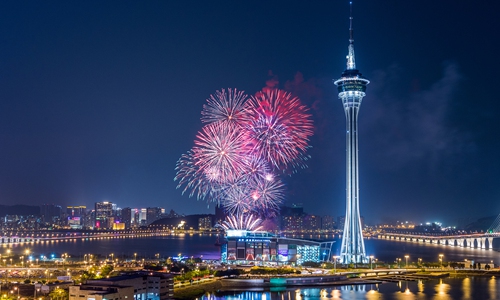HOME >> OPINION
West shows ill will to ignore Macao’s boom
Source:Global Times Published: 2019/12/20 22:08:40

A general view of Macao Photo: VCG
Friday marks the 20th anniversary of Macao's return to China. The world attention is focused on this affluent city which has seen its economy developing rapidly since its return and now has the second highest GDP per capita worldwide.
The Macao Special Administrative Region (SAR) has accurately implemented the "one country, two systems" principle, and unlike Hong Kong, fierce political protests have never happened in Macao. Some Western media are green-eyed about this. They use terms such as "submissive" to describe Macao's increased security during the anniversary celebration. They said some reporters from Western countries and Hong Kong and Taiwan were interrogated when going to Macao, saying Macao is becoming more and more like the mainland. These media are picking faults with Macao.
The practice of the "one country, two systems" principle has been successful in Macao, which has been proven by the city's economic and social development. After Macao returned to China, the governance of the Chinese central government and the SAR's high degree of autonomy have been coordinating effectively, leading to harmonious interactions between Macao and the mainland. This is the fundamental purpose and significance of Macao's return. Under the governance of China, Macao has adapted to the sovereignty change and has sought impetus for its continuous development. This is the only path for Macao to realize sustainable prosperity.
However, some Westerners have been hoping to see bumps along the path, like the situation in Hong Kong. The ongoing radical protests in Hong Kong have jeopardized the city's core values and the rule of law. Some US political elite, however, call the chaos in Hong Kong "a beautiful sight to behold." They remain silent on the rapid development and good governance of Macao, yet tend to hype cases when radical Westerners met blocks on their way to Macao.
These people are narrow-minded and extreme. They do not wish for China's bright future, nor do they want to see the bright future of Macao, a city that has coordinated well with the central government. Some Westerners do not want to see "one country, two systems" succeed in China. They want it to be a conflict that consumes China.
In fact, every society can be narrow-minded externally. But the Western system encourages such unhealthy mentality, and the US and other Western countries' policies are led and restrained by the mentality. Some US and Western opinions encouraged and hyped Hong Kong riots, but they are indifferent to Macao's peaceful and stable development. Their pettiness and unkindness are obvious.
Western public opinion has been abducted by the improper geopolitical mindset and value paranoia. Thus, they are indifferent even when facing the facts, and they cling to their stereotypes of China. It has become their political correctness to prove China's faults.
China has not been involved in a war in the past decades, nor has it coerced any country in the traditional geopolitical sense. China has been diligently developing. Although China has a different political system from the West, it is generally modest. We do not know where the Western opinion's complaints come from. The US and the West are responsible for their disputes with China.
"One country, two systems" should be implemented Macao's way. Hong Kong and Macao's high degree of autonomy is realistic and is in line with the wishes of people from the two cities and the mainland. But their autonomy should not undermine the framework of "one country" or damage national security. The two cities should not confront the central government, and it is justified that the Basic Law should make constitutional arrangements for this.
"One country, two systems" is practiced better in Macao than in Hong Kong, and it is more in line with the interests of the local majority. Some people are not convinced, but facts and time will convince them. Before the return, Macao's GDP per capita was much lower than that of Hong Kong, but it is now nearly double that of Hong Kong. This refutes all kinds of arguments. Time will tell.
Posted in: EDITORIAL